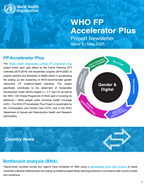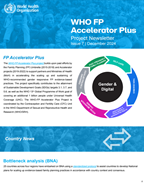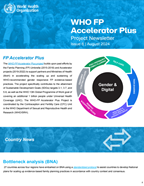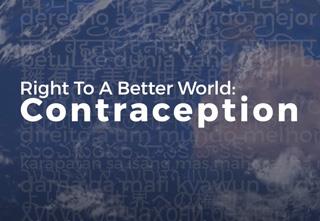2024 Kidula N, Nguyen BT, Habib N, Festin M, Toskin I, Kiarie J. The role of the World Health Organization in male contraceptive development. Andrology . 2024;12(7):1501-1505. doi:10.1111/andr.13675
Joshi B N, Bhavya M K, Prusty R K, Tandon D, Kabra R, Allagh K P, Khan S L Knowledge, perception and practices adapted during COVID-19: A qualitative study in a district in Maharashtra, India . The Journal of community health management : JCHM , 28 Sep 2024, Vol. 11, Issue 3, pages 157 - 164.
Jahanfar S, Mortazavi J, Lapidow A, et al. Assessing the impact of hormonal contraceptive use on menstrual health among women of reproductive age - a systematic review. Eur J Contracept Reprod Health Care . Published online July 15, 2024. doi:10.1080/13625187.2024.2373143
Tripathi V, RamaRao S, Kabra R, et al. Strengthening the family planning component of maternal health care: A new call to action to seize the opportunity provided by universal health coverage and primary healthcare frameworks. Int J Gynaecol Obstet . 2024;166(2):479-482. doi:10.1002/ijgo.15732
Jahanfar S, Mortazavi J, Lapidow A, et al. Assessing the impact of contraceptive use on mental health among women of reproductive age - a systematic review. BMC Pregnancy Childbirth . 2024;24(1):396. Published 2024 May 30. doi:10.1186/s12884-024-06587-9
Tran NT, Ali M, Azmat SK, et al. Strengthening contraceptive counselling services to empower clients and meet their needs: protocol for a two-stage, multiphase complex intervention in Pakistan and Nigeria. BMJ Open . 2024;14(6):e081967. Published 2024 Jun 5. doi:10.1136/bmjopen-2023-081967
Jahanfar S, Maurer O, Lapidow A, Oberoi AR, Steinfeldt M, Ali M. A meta-analysis into the mediatory effects of family planning utilization on complications of pregnancy in women of reproductive age. PLoS One . 2024;19(3):e0294475. Published 2024 Mar 18. doi:10.1371/journal.pone.0294475
Lassi ZS, Rahim KA, Stavropoulos AM, et al. Use of contraceptives, empowerment and agency of adolescent girls and young women: a systematic review and meta-analysis. BMJ Sex Reprod Health . 2024;50(3):195-211. Published 2024 Jul 12. doi:10.1136/bmjsrh-2023-202151
Kabra R, Allagh KP, Kini BN, Kanke RM, Kiarie J. Scaling postpartum family planning services in the Democratic Republic of Congo: outcomes and lessons learned. BMJ Sex Reprod Health . 2024;50(2):146-149. Published 2024 Apr 11. doi:10.1136/bmjsrh-2023-202114
2023 Ali M, Kiarie J, Shah I. Priorities for research on family planning impact: recommendations of a WHO Think Tank meeting. Fam Med Community Health . 2023;11(4):e002406. doi:10.1136/fmch-2023-002406
Millogo T, Chomi E, Kouanda S, Ali M. Getting Up to Date with What Works: A Systematic Review on the Effectiveness and Safety of Task Sharing of Modern Methods in Family Planning Services. Biomed Res Int . 2023;2023:8735563. Published 2023 Feb 7. doi:10.1155/2023/8735563
Boydell V, Steyn PS, Cordero JP, et al. The role of social accountability in changing service users' values, attitudes, and interactions with the health services: a pre-post study. BMC Health Serv Res . 2023;23(1):957. Published 2023 Sep 6. doi:10.1186/s12913-023-09971-x
Rehnström Loi U, Sorhaindo A, Embo M, Kabra R, Kiarie J, Ganatra B. Aligning health worker education and learning approaches with population health needs: WHO's Family Planning and Comprehensive Abortion Care Toolkit for the primary healthcare workforce. BMJ Glob Health . 2023;8(Suppl 4):e013256. doi:10.1136/bmjgh-2023-013256
Milford, C., Cordero, J., Nai, D., Shamba, D., Fuseini, K., Boydell, V., Tarimo, A., McMullen, H., & Steyn, P. (2023). The Methodological Approach to a Process Evaluation of a Community and Provider-Driven Social Accountability Intervention to Increase Contraceptive Uptake and Use. International Journal of Qualitative Methods , 22. doi:10.1177/16094069231169890
Steyn PS, Cordero JP, Nai D, et al. The impact of community and provider-driven social accountability interventions on contraceptive use: findings from a cohort study of new users in Ghana and Tanzania. Int J Equity Health . 2023;22(1):167. Published 2023 Aug 28. doi:10.1186/s12939-023-01928-0
Azmat SK, Ali M, Rahman MM. Assessing the sustainability of two independent voucher-based family planning programs in Pakistan: a 24-months post-intervention evaluation. Contracept Reprod Med . 2023;8(1):43. Published 2023 Aug 22. doi:10.1186/s40834-023-00244-w
Nabhan A, Kabra R, Allam N, et al. Implementation strategies, facilitators, and barriers to scaling up and sustaining post pregnancy family planning, a mixed-methods systematic review. BMC Womens Health . 2023;23(1):379. Published 2023 Jul 19. doi:10.1186/s12905-023-02518-6
Gonsalves L, Kamuyango A, Chandra-Mouli V. Pharmacies: an important source of contraception for some adolescents, but not a panacea for all. Sex Reprod Health Matters . 2023;31(1):2221883. doi:10.1080/26410397.2023.2221883
Aderoba AK, Steyn PS, Kiarie JN. Implementation strategies to scale up self-administered depot medroxyprogesterone acetate subcutaneous injectable contraception: a scoping review. Syst Rev . 2023;12(1):114. Published 2023 Jul 4. doi:10.1186/s13643-023-02216-2
Kabra R, Chikvaidze P, Mubasher A, Allagh KP, Gholbzouri K, Kiarie J. Scaling-up post-pregnancy family planning services: experiences and challenges from Afghanistan. BMJ Sex Reprod Health . 2023;49(3):222-224. doi:10.1136/bmjsrh-2023-201820
Allagh KP, Triulzi I, Kiarie J, Kabra R. Scoping review on the use of South-South learning exchange to scale up evidence-based practices in family planning. BMJ Glob Health . 2023;8(6):e011635. doi:10.1136/bmjgh-2022-011635
Kabra R, Joshi B, Elisaria E, et al. Determining the Impact of the COVID-19 Pandemic on Availability, Use, and Readiness of Family Planning and Contraceptive Services at Selected Primary Health Care Facilities in Africa and Asia: Protocol for a Mixed Methods Study. JMIR Res Protoc . 2023;12:e43329. Published 2023 May 10. doi:10.2196/43329
Maceira D, Oizerovich S, Perrotta G, et al. Acceptability and continuation of use of the subdermal contraceptive implant among adolescents and young women in Argentina: a retrospective cohort study. Sex Reprod Health Matters . 2023;31(1):2189507. doi:10.1080/26410397.2023.2189507
Allagh KP, Kiarie J, Triulzi I, Kabra R. Scoping review protocol to map evidence on South-South learning exchange in family planning. BMJ Open . 2023;13(3):e061685. Published 2023 Mar 24. doi:10.1136/bmjopen-2022-061685
Borg SA, Narasimhan M, Wuliji T. Mobile learning to support health workers in pharmacies in expanding access to over-the-counter contraceptives: The World Health Organization Academy Learning Programme. Sex Reprod Health Matters . 2022;30(1):2089084. doi:10.1080/26410397.2022.2089084
2022 Steyn PS, Cordero JP, Nai D, et al. Impact of community and provider-driven social accountability interventions on contraceptive uptake in Ghana and Tanzania. Int J Equity Health . 2022;21(1):142. Published 2022 Sep 28. doi:10.1186/s12939-022-01736-y
Pyra M, Heffron R, Haberer JE, Kiarie J. HIV prevention metrics: lessons to be learned from contraception. J Int AIDS Soc . 2022;25(8):e25958. doi:10.1002/jia2.25958
WHO Special Issue: Contraceptive Values & Preferences, Contraception, Volume
111, Pages 1-70 (July 2022)
Gómez Ponce de Leon R, Bahamondes MV, Hellwig F, et al. Potential of LARC to recover loss in satisfied demand for modern contraception after the COVID-19 pandemic: a case scenario analysis of Brazil and Mexico. Rev Panam Salud Publica . 2022;46:e41. Published 2022 Jun 3. doi:10.26633/RPSP.2022.41
Kabra R, Danansuriya M, Moonesinghe L, et al. Improving access to quality family planning services in Nepal and Sri Lanka: insights from a South-South learning exchange. BMJ Glob Health . 2022;7(5):e008691. doi:10.1136/bmjgh-2022-008691
Bearak JM, Popinchalk A, Beavin C, et al. Country-specific estimates of unintended pregnancy and abortion incidence: a global comparative analysis of levels in 2015-2019. BMJ Glob Health . 2022;7(3):e007151. doi:10.1136/bmjgh-2021-007151
Gichangi P, Gonsalves L, Mwaisaka J, et al. Busting contraception myths and misconceptions among youth in Kwale County, Kenya: results of a digital health randomised control trial. BMJ Open . 2022;12(1):e047426. Published 2022 Jan 6. doi:10.1136/bmjopen-2020-047426
2021 Azmat SK, Lashari T, Ali M, Awan MA, Karim A. Contraceptive access, choices, and discontinuation among the urban users in Karachi, Pakistan: Findings from a comparative analysis of Pakistan demographic and health survey 2012-12 and 2017-18. J Pak Med Assoc . 2021;71(Suppl 7)(11):S38-S44.
Azmat SK, Temmerman M, Ali M. Accessibility and uptake of modern contraceptive methods in Pakistan - a critical view on what works?. J Pak Med Assoc . 2021;71(Suppl 7)(11):S20-S32.
Ali M, Tran NT. Defining counselling in contraceptive information and services: outcomes from an expert think tank. BMJ Sex Reprod Health . 2022;48(2):79-81. doi:10.1136/bmjsrh-2021-201132
Ali M, Tran NT, Kabra R, Kiare J. Strengthening contraceptive counselling: gaps in knowledge and implementation research. BMJ Sex Reprod Health . 2022;48(4):235-237. doi:10.1136/bmjsrh-2021-201104
Kim C, Nguyen AT, Berry-Bibee E, Ermias Y, Gaffield ME, Kapp N. Systemic hormonal contraception initiation after abortion: A systematic review and meta-analysis. Contraception . 2021;103(5):291-304. doi:10.1016/j.contraception.2021.01.017
2020 Steyn PS, Boydell V, Cordero JP et al. Rationale and design of a complex intervention measuring the impact and processes of social accountability applied to contraceptive programming: CaPSAI Project [version 2; peer review: 2 approved]. Gates Open Res 2020, 4:26
Marston C, McGowan CR, Boydell V, Steyn P. Methods to measure effects of social accountability interventions in reproductive, maternal, newborn, child, and adolescent health programs: systematic review and critique. J Health Popul Nutr . 2020;39(1):13. Published 2020 Dec 7. doi:10.1186/s41043-020-00220-z
Strong K, Noor A, Aponte J, et al. Monitoring the status of selected health related sustainable development goals: methods and projections to 2030. Glob Health Action . 2020;13(1):1846903. doi:10.1080/16549716.2020.1846903
Habib N, Steyn PS, Boydell V, et al. The use of segmented regression for evaluation of an interrupted time series study involving complex intervention: the CaPSAI project experience. Health Serv Outcomes Res Methodol . 2021;21(2):188-205. doi:10.1007/s10742-020-00221-9
Boydell V, Steyn PS, Cordero JP, et al. Adaptation and validation of social accountability measures in the context of contraceptive services in Ghana and Tanzania. Int J Equity Health . 2020;19(1):183. Published 2020 Oct 15. doi:10.1186/s12939-020-01286-1
Ali M, Azmat SK, Hamza HB, Rahman MM. Assessing Effectiveness of Multipurpose Voucher Scheme to Enhance Contraceptive Choices, Equity, and Child Immunization Coverage: Results of an Interventional Study from Pakistan. J Multidiscip Healthc . 2020;13:1061-1074. Published 2020 Sep 30. doi:10.2147/JMDH.S245900
Belizan M, Maradiaga E, Roberti J, et al. Contraception and post abortion services: qualitative analysis of users' perspectives and experiences following Zika epidemic in Honduras. BMC Womens Health . 2020;20(1):199. Published 2020 Sep 12. doi:10.1186/s12905-020-01066-7
Gonsalves L, Martin Hilber A, Wyss K, Say L. Potentials and pitfalls of including pharmacies as youth-friendly contraception providers in low- and middle-income countries. BMJ Sex Reprod Health . 2021;47(1):6-8. doi:10.1136/bmjsrh-2020-200641
Chandra-Mouli V, Akwara E. Improving access to and use of contraception by adolescents: What progress has been made, what lessons have been learnt, and what are the implications for action?. Best Pract Res Clin Obstet Gynaecol . 2020;66:107-118. doi:10.1016/j.bpobgyn.2020.04.003
Young Holt B, Kiarie J, Kopf GS, Nanda K, Hemmerling A, Achilles SL. Bridging the gap: advancing multipurpose prevention technologies from the lab into the hands of women. Biol Reprod . 2020;103(2):286-288. doi:10.1093/biolre/ioaa085
Gonsalves L, Wyss K, Gichangi P, Hilber AM. Pharmacists as youth-friendly service providers: documenting condom and emergency contraception dispensing in Kenya. Int J Public Health . 2020;65(4):487-496. doi:10.1007/s00038-020-01348-9
Riedel EMC, Turner DT, Kobeissi LH, Karyotaki E, Say L, Cuijpers P. The impact of psychosocial interventions on condom and contraceptive use in LMICs: Meta-analysis of randomised controlled trials. Glob Public Health . 2020;15(8):1182-1199. doi:10.1080/17441692.2020.1744679
Kennedy CE, Yeh PT, Gaffield ME. Contraception values and preferences: protocol and methods for a global systematic review. Contraception . 2020;101(2):69-73. doi:10.1016/j.contraception.2018.05.006
Tran NT, Seuc A, Tshikaya B, et al. Effectiveness of post-partum family planning interventions on contraceptive use and method mix at 1 year after childbirth in Kinshasa, DR Congo (Yam Daabo): a single-blind, cluster-randomised controlled trial. Lancet Glob Health . 2020;8(3):e399-e410. doi:10.1016/S2214-109X(19)30546-7







/sexual-and-reproductive-health-and-research-(srh)/hormonal-contraception.tmb-549v.png?sfvrsn=6012a7a0_1)
/sexual-and-reproductive-health-and-research-(srh)/temporary-contraception.tmb-549v.png?sfvrsn=ffd932e1_1)
/sexual-and-reproductive-health-and-research-(srh)/safe-and-effective-contraception.tmb-549v.png?sfvrsn=d173f15_1)




